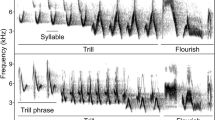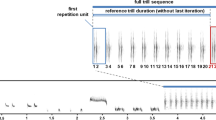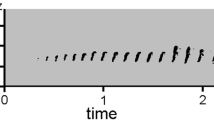Abstract
In many tropical birds, both sexes use conspicuous vocal signals during territorial interactions. Although a growing number of studies examine male and female signals in the context of coordinated vocal duets, the use of vocal signals by both sexes in non-duetting species is poorly documented, even though these species are more numerous than duetting species. Furthermore, few studies of tropical non-duetting species test for seasonal variation in signaling behavior. We studied season-specific and sex-specific variation in signaling behavior of a tropical resident songbird, the Rufous-capped Warbler (Basileuterus rufifrons), by conducting a playback experiment where we simulated conspecific territorial intruders producing three types of vocalizations (male songs, female calls, or a “pair” with simultaneous male songs and female calls) and a heterospecific control. We repeated playback during the pre-breeding and breeding seasons. Response intensity to playback varied with season and sex of the focal birds. During the pre-breeding season, both sexes showed strong physical approach responses and vocal responses to all conspecific intrusions, especially paired intrusions. During the breeding season, males responded strongly to all conspecific treatments, whereas females showed little response. Although females primarily used calls in response to conspecific playback, many females also sang, especially during the non-breeding season. Our results therefore suggest that both male and female signals are used for shared territory defense, but that the contributions of each sex to territory defense vary seasonally. Our results also contribute to our understanding of the evolution of combined male and female signaling during territory defense.
Significance statement
In resident tropical animals, both males and females often use conspicuous signals during territorial interactions with conspecifics. Seasonal and sex-specific variation in vocal behavior of tropical resident birds during these territorial interactions has received little research attention. We conducted a playback experiment to investigate season- and sex-specific variation in signaling behavior of tropical Rufous-capped Warblers (B. rufifrons). In the pre-breeding season, both sexes responded strongly to all conspecific intrusions, especially paired intrusions, by approaching the playback speakers and vocalizing. In the breeding season, males actively defended the territory alone whereas females rarely responded. Our results suggest that both sexes of Rufous-capped Warbler use vocal signals for shared territory defense, although the contributions of each sex to territory defense differ seasonally.





Similar content being viewed by others
References
Akçay Ç, Tom ME, Campbell SE, Beecher MD (2013) Song type matching is an honest early threat signal in a hierarchical animal communication system. Proc R Soc B 280:20122517
Akçay Ç, Campbell SE, Beecher MD (2014) Individual differences affect honest signalling in a songbird. Proc R Soc B 281:20132496
Ballentine B, Badyaev A, Hill GE (2003) Changes in song complexity correspond to periods of female fertility in blue grosbeaks (Guiraca caerulea). Ethology 109:55–66. https://doi.org/10.1046/j.1439-0310.2003.00852.x
Barker FK, Burns KJ, Klicka J, Lanyon SM, Lovette IJ (2015) New insights into new world biogeography: an integrated view from the phylogeny of blackbirds, cardinals, sparrows, tanagers, warblers, and allies. Auk 132:333–348. https://doi.org/10.1642/AUK-14-110.1
Benedict L (2010) California towhee vocal duets are multi-functional signals for multiple receivers. Behaviour 147:953–978. https://doi.org/10.1163/000579510X498633
Benjamini Y, Hochberg Y (1995) Controlling the false discovery rate: a practical and powerful approach to multiple testing. J R Stat Soc B 57:289–300
Bradbury JW, Vehrencamp SL (2011) Principles of animal communication. Sinauer, Sunderland
Brumm H, Zollinger SA, Niemelä PT, Sprau P (2017) Measurement artefacts lead to false positives in the study of birdsong in noise. Methods Ecol Evol 8:1617–1625. https://doi.org/10.1111/2041-210X.12766
Busch DS, Wingfield JC, Moore IT (2004) Territorial aggression of a tropical passerine, Zonotrichia capensis, in response to a variety of conspecific intruders. Behaviour 141:1173–1188
Cain KE, Langmore NE (2015) Female and male song rates across breeding stage: testing for sexual and nonsexual functions of female song. Anim Behav 109:65–71. https://doi.org/10.1016/j.anbehav.2015.07.034
Candolin U, Tukiainen I (2015) The sexual selection paradigm: have we overlooked other mechanisms in the evolution of male ornaments? Proc R Soc B 282:201501987. https://doi.org/10.1098/rspb.2015.1987
Catchpole CK, Slater PJB (2008) Bird song: biological themes and variations, 2nd edn. Cambridge University Press, Cambridge
Colombelli-Négrel D (2016) Female splendid and variegated fairy-wrens display different strategies during territory defence. Anim Behav 119:99–110. https://doi.org/10.1016/j.anbehav.2016.07.001
Curson JM (2010) Family Parulidae (new world warblers). In: del Hoyo J, Elliot A, Christie DA (eds) Handbook of the birds of the world, vol. 15. Weavers to new world warblers. Lynx Edicions, Barcelona, pp 666–800
Dahlin CR, Benedict L (2014) Angry birds need not apply: a perspective on the flexible form and multifunctionality of avian vocal duets. Ethology 120:1–10. https://doi.org/10.1111/eth.12182
Dahlin CR, Wright TF (2012) Duet function in the yellow-naped amazon, Amazona auropalliata: evidence from playbacks of duets and solos. Ethology 118:95–105. https://doi.org/10.1111/j.1439-0310.2011.01988.x
Douglas SB, Mennill DJ (2010) A review of acoustic playback techniques for studying avian vocal duets. J Field Ornithol 81:115–129. https://doi.org/10.1111/j.1557-9263.2010.00268.x
Dowling J, Webster MS (2016) An experimental test of duet function in a fairy-wren (Malurus) with moderate cuckoldry rates. Behav Ecol 27:228–236. https://doi.org/10.1093/beheco/arv144
Fedy BC, Stutchbury BJM (2005) Territory defence in tropical birds: are females as aggressive as males? Behav Ecol Sociobiol 58:414–422. https://doi.org/10.1007/s00265-005-0928-4
Freed LA (1987) The long-term pair bond of tropical house wrens: advantage or constraint? Am Nat 130:507–525
Gil D, Graves J, Slater P (2007) Extra-pair paternity and song characteristics in the willow warbler Phylloscopus trochilus. J Avian Biol 38:291–297. https://doi.org/10.1111/j.0908-8857.2007.03868.x
Gilbert WM, Carroll AF (1999) Singing in a mated female Wilson’s warbler. Wilson Bull 111:134–137
Gill SA, Alfson ED, Hau M (2007) Context matters: female aggression and testosterone in a year-round territorial neotropical songbird (Thryothorus leucotis). Proc R Soc Lond B 274:2187–2194. https://doi.org/10.1098/rspb.2007.0457
Gill SA, Costa LM, Hau M (2008) Males of a single-brooded tropical bird species do not show increases in testosterone during social challenges. Horm Behav 54:115–124. https://doi.org/10.1016/j.yhbeh.2008.02.003
Hall ML (2004) A review of hypotheses for the functions of avian duetting. Behav Ecol Sociobiol 55:415–430
Hall ML, Peters A (2008) Coordination between the sexes for territorial defence in a duetting fairy-wren. Anim Behav 76:65–73. https://doi.org/10.1016/j.anbehav.2008.01.010
Hall ML, Rittenbach MRD, Vehrencamp SL (2015) Female song and vocal interactions with males in a neotropical wren. Front Ecol Evol 3:12. https://doi.org/10.3389/fevo.2015.00012
Hof D, Hazlett N (2010) Low-amplitude song predicts attack in a North American wood warbler. Anim Behav 80:821–828. https://doi.org/10.1016/j.anbehav.2010.07.017
Hof D, Podos J (2013) Escalation of aggressive vocal signals: a sequential playback study. Proc R Soc B 280:20131553
Hutto RL (1988) Foraging behavior patterns suggest a possible cost associated with participation in mixed-species bird flocks. Oikos 51:79–83
Illes AE (2015) Context of female bias in song repertoire size, singing effort, and singing independence in a cooperatively breeding songbird. Behav Ecol Sociobiol 69:139–150. https://doi.org/10.1007/s00265-014-1827-3
Jedlicka JA, Greenberg R, Perfecto I, Philpott SM, Dietsch TV (2006) Seasonal shift in the foraging niche of a tropical avian resident: resource competition at work? J Trop Ecol 22:385–395. https://doi.org/10.1017/S0266467406003191
Koloff J, Mennill DJ (2013) The responses of duetting antbirds to stereo duet playback provide support for the joint territory defence hypothesis. Ethology 119:462–471. https://doi.org/10.1111/eth.12084
Kraaijeveld K, Kraaijeveld-Smit FJL, Komdeur J (2007) The evolution of mutual ornamentation. Anim Behav 74:657–677. https://doi.org/10.1016/j.anbehav.2006.12.027
Krieg CA, Getty T (2016) Not just for males: females use song against male and female rivals in a temperate zone songbird. Anim Behav 113:39–47. https://doi.org/10.1016/j.anbehav.2015.12.019
Logue DM (2005) Cooperative defence in duet singing birds. Cogn Brain Behav 9:497–510
Macedo RH, Karubian J, Webster MS (2008) Extrapair paternity and sexual selection in socially monogamous birds: are tropical birds different? Auk 125:769–777. https://doi.org/10.1525/auk.2008.11008
Matthews AE, Slevin MC, Worm AJ, Boves TJ (2016) Female Prothonotary Warblers Protonotaria citrea sing during the mate acquisition period. Ibis 159:221–224. https://doi.org/10.1111/ibi.12421
McGregor PK (1992) Quantifying responses to playback: one, many, or composite multivariate measures? In: McGregor PK (ed) Playback and studies of animal communication. Plenum Press, New York, pp 79–96
Mennill DJ (2006) Aggressive responses of male and female rufous-and-white wrens to stereo duet playback. Anim Behav 71:219–226. https://doi.org/10.1016/j.anbehav.2005.05.006
Mennill DJ, Vehrencamp SL (2008) Context-dependent functions of avian duets revealed by microphone-array recordings and multispeaker playback. Curr Biol 18:1314–1319. https://doi.org/10.1016/j.cub.2008.07.073
Morrison EB, Lindell CA (2011) Active or passive forest restoration? Assessing restoration alternatives with avian foraging behavior. Restor Ecol 19:170–177. https://doi.org/10.1111/j.1526-100X.2010.00725.x
Morrison EB, Lindell CA, Holl KD, Zahawi RA (2010) Patch size effects on avian foraging behaviour: implications for tropical forest restoration design. J Appl Ecol 47:130–138. https://doi.org/10.1111/j.1365-2664.2009.01743.x
Murphy TG, West JA, Pham TT, Cevallos LM, Simpson RK, Tarvin KA (2014) Same trait, different receiver response: unlike females, male American goldfinches do not signal status with bill colour. Anim Behav 93:121–127. https://doi.org/10.1016/j.anbehav.2014.04.034
Najar N, Benedict L (2015) Female song in new world wood warblers. Front Ecol Evol 3:139. https://doi.org/10.3389/fevo.2015.00139
Neudorf DL, Tarof SA (1998) The role of chip calls in winter territoriality of Yellow Warblers. J Field Ornithol 69:30–36
Nolan V (1978) The ecology and behavior of the Prairie Warbler, Dendroica discolor. Ornithol Monogr 26:1–595
Odom KJ, Hall ML, Riebel K, Omland KE, Langmore NE (2014) Female song is widespread and ancestral in songbirds. Nat Commun 5:3379. https://doi.org/10.1038/ncomms4379
Odom KJ, Logue DM, Studds CE, Monroe MK, Campbell SK, Omland KE (2017) Duetting behavior varies with sex, season, and singing role in a tropical oriole (Icterus icterus). Behav Ecol 28:1256–1265. https://doi.org/10.1093/beheco/arx087
Perfecto I, Vandermeer JH, Bautista GL, Nuñez GI, Greenberg R, Bichier P, Langridge S (2004) Greater predation in shaded coffee farms: the role of resident neotropical birds. Ecology 85:2677–2681
Quinn GP, Keough MJ (2002) Experimental design and data analysis for biologists. Cambridge University Press, Cambridge
R Development Core Team (2016) R: a language and environment for statistical computing. R Foundation for Statistical Computing, Vienna
Robinson MR, Kruuk LEB (2007) Function of weaponry in females: the use of horns in intrasexual competition for resources in female Soay sheep. Biol Lett 3:651–654. https://doi.org/10.1098/rsbl.2007.0278
Sandoval L, Méndez C, Mennill DJ (2013) Different vocal signals, but not prior experience, influence heterospecific from conspecific discrimination. Anim Behav 85:907–915. https://doi.org/10.1016/j.anbehav.2013.02.006
Staicer CA (1996) Honest advertisement of pairing status: evidence from a tropical resident wood-warbler. Anim Behav 51:375–390. https://doi.org/10.1006/anbe.1996.0036
Stiles FG, Skutch AF (1989) A guide to the birds of Costa Rica. Cornell University Press, Ithaca
Stutchbury BJM, Morton ES (2001) Behavioral ecology of tropical birds. Academic Press, San Diego
Taff CC, Littrell KA, Freeman-Gallant CR (2012) Female song in the common yellowthroat. Wilson J Ornithol 124:370–374
Tibbetts EA, Forrest T, Vernier C, Jinn J, Madagame A (2015) Socially selected ornaments and fitness: signals of fighting ability in paper wasps are positively associated with survival, reproductive success, and rank. Evolution 69:2917–2926. https://doi.org/10.1111/evo.12793
Tobias JA, Gamarra-Toledo V, García-Olaechea D, Pulgarín PC, Seddon N (2011) Year-round resource defence and the evolution of male and female song in suboscine birds: social armaments are mutual ornaments. J Evol Biol 24:2118–2138. https://doi.org/10.1111/j.1420-9101.2011.02345.x
Tobias JA, Montgomerie R, Lyon BE (2012) The evolution of female ornaments and weaponry: social selection, sexual selection and ecological competition. Philos Trans R Soc B 367:2274–2293. https://doi.org/10.1098/rstb.2011.0280
Tobias JA, Sheard C, Seddon N, Meade A, Cotton AJ, Nakagawa S (2016) Territoriality, social bonds, and the evolution of communal signaling in birds. Front Ecol Evol 4:74. https://doi.org/10.3389/fevo.2016.00074
Watson NL, Simmons LW (2010) Reproductive competition promotes the evolution of female weaponry. Proc R Soc Lond B 277:2035–2040. https://doi.org/10.1098/rspb.2009.2335
West-Eberhard MJ (1983) Sexual selection, social competition, and speciation. Q Rev Biol 58:155–183
Wicklund CG, Village A (1992) Sexual and seasonal variation in territorial behaviour of kestrels, Falco tinnunculus. Anim Behav 43:823–830
Zhang VY, Celis-Murillo A, Ward MP (2015) Conveying information with one song type: changes in dawn song performance correspond to different female breeding stages. Bioacoustics 4622:1–10. https://doi.org/10.1080/09524622.2015.1076348
Zollinger SA, Podos J, Nemeth E, Goller F, Brumm H (2012) On the relationship between, and measurement of, amplitude and frequency in birdsong. Anim Behav 84:e1–e9. https://doi.org/10.1016/j.anbehav.2012.04.026
Acknowledgments
A. Demarse provided valuable field assistance as an observer during playback trials. K. McGuire assisted with song classification. We thank the staff of Sector Santa Rosa for logistical support, especially R. Blanco. Members of the Mennill lab group and three anonymous reviewers provided valuable feedback which improved the manuscript.
Funding
This research was funded through scholarship support from the Natural Sciences and Engineering Research Council of Canada (NSERC) to ADD and grant support from NSERC, the Government of Ontario, the University of Windsor, and the Canada Foundation for Innovation to DJM.
Author information
Authors and Affiliations
Corresponding author
Ethics declarations
Conflict of interest
The authors declare that they have no conflicts of interest.
Ethical approval
All applicable international, national, and institutional guidelines for the care and use of animals were followed. All procedures using animals were authorized under permits from the University of Windsor Animal Care Committee (AUPP-13-15), the Government of Costa Rica (MINAE), and the Area de Conservación Guanacaste.
Additional information
Communicated by H. Brumm
Rights and permissions
About this article
Cite this article
Demko, A.D., Mennill, D.J. Male and female signaling behavior varies seasonally during territorial interactions in a tropical songbird. Behav Ecol Sociobiol 72, 84 (2018). https://doi.org/10.1007/s00265-018-2495-5
Received:
Revised:
Accepted:
Published:
DOI: https://doi.org/10.1007/s00265-018-2495-5




